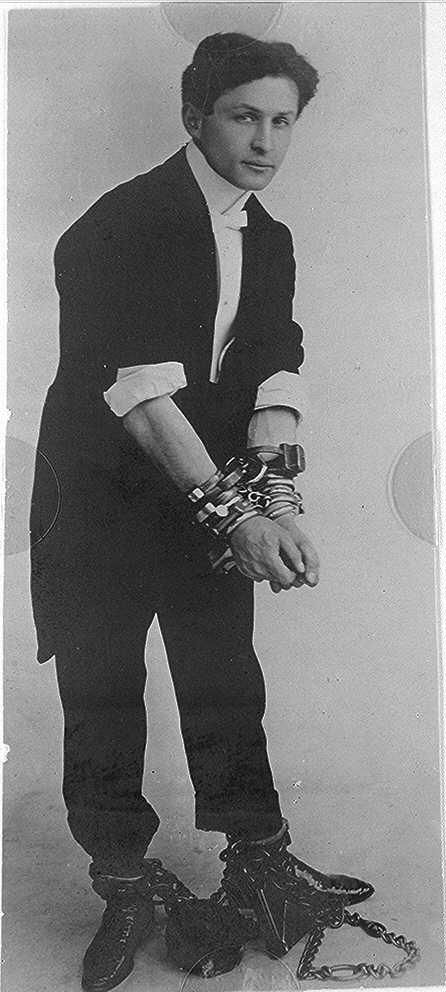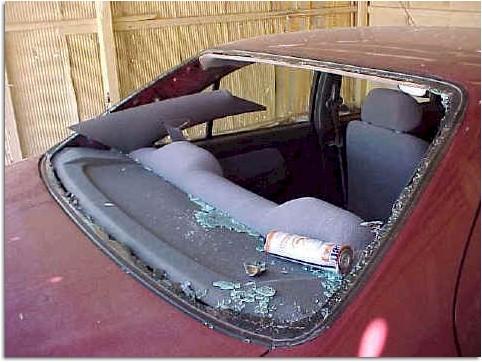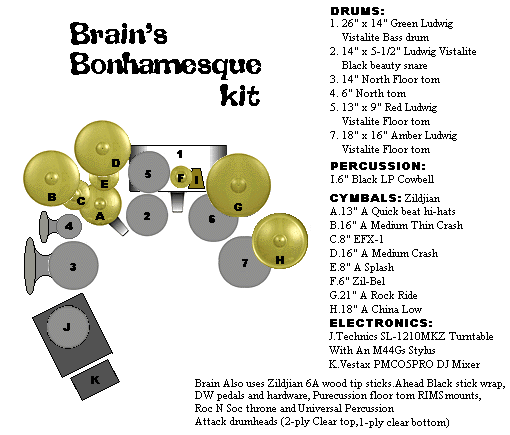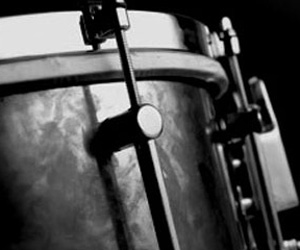Drum Tips - Theft Prevention
Keeping Your Drums Safe
I want to trust in the goodness of people. I want to live in a world where people treat each other with kindness and respect. Unfortunately, this is the world as it aught to be not the world as it is.It is amazing how much equipment just “walks off” each year. Somebody wants to steal your drums set. The “bad guys” are out there just waiting for you to let down your guard. I make no claim at being a security expert, but I can share a few simple tips to help keep your drums safe.
Lock 'em up:
 It’s really a simple concept, just keep the door to your rehearsal space locked. I used to rehearse in a warehouse with a few dozen other bands. Everybody had a little 15x20 rehearsal room within this big warehouse. It was great because I could leave my drums set up all the time and just come in, sit down, and play. At the end of rehearsal there was no need to break down and load all the music equipment out.
It’s really a simple concept, just keep the door to your rehearsal space locked. I used to rehearse in a warehouse with a few dozen other bands. Everybody had a little 15x20 rehearsal room within this big warehouse. It was great because I could leave my drums set up all the time and just come in, sit down, and play. At the end of rehearsal there was no need to break down and load all the music equipment out.One of the other bands lost all their instruments one night - everything – simply because they forgot to lock the door to their rehearsal space. They finished up for the evening and left, forgetting to lock the door behind them. Everything was gone the next day.
I remember playing a club in Sacramento once that had a little back room behind the stage. There was a door in the back room for loading in equipment. One night somebody actually left the door wide open to help keep a breeze blowing through the club. Unfortunately two guitars walked right out that back door.
Don't let this happen to you. Just lock the door.
Don’t leave your drums in your car:

Far too many musical instruments are stolen from the parking lot. Folks think putting their drums in the car and locking it will keep them safe. Wrong! Leaving your drums in the parking lot is an invitation to the bad guys to take them! I once made the mistake of leaving a duffle bag full of drum stands - heavy stands - in the car. I figured it was just the stands - they are far too heavy and not valuable enough for anyone to bother stealing. I was wrong. The bad guys smashed the window and pulled that bag full of heavy-metal right through it.
When you finish the show - if you can’t leave your drums on stage, in a locked room of the club, or under supervision - take everything back home, to you rehearsal studio, or hotel room and lock it up – out of sight, out of mind.
Engrave your drums and cymbals:
Your chances of getting a stolen drum set back are much better if all your equipment is clearly marked with identifying information. Engrave it with your name, or e-mail address, or drivers license number, something else that is easily and clearly identifiable as yours and yours alone. A friend of mine had some cymbals stolen. He reported the loss to the Police and gave them all the engraved info that was on them. A few months later, he found them in a pawn shop in Berkeley. Because the Police already had all the info, and the cymbals at the pawn shop were clearly engraved with his information, there was no hassle at all, the pawnshop handed over the cymbals to the police and the police gave them right back to my friend. He got his cymbals back and the police got the bad guy.Inside the bell of your cymbals is a good place to engrave, anywhere on the stands, I generally prefer engraving in less obvious places like inside the rim on the drums so that it doesn’t show up when I’m playing and so if they ever are stolen maybe the bad guys won’t notice the engraving and try to scratch it out.
You can get an engraver from Amazon.com for less than $20. Some police departments have an engraver that you can borrow. Get a few other bands together and split the cost between all of you to make it very affordable. Do it now so you don't have any regrets!
Document Your Drum Set:

This means making a list of the manufacturer, model and, where available, serial number of your drums, stands, cymbals, pedals, etc., taking pictures of your drums (both the entire drum set and each individual drum, cymbal, stand and pedal) and keeping it all together in a folder with your original sales receipts. If your drums are ever stolen you will need to include this information in Police reports.
Having a detailed equipment list, photographs, copies of receipts, etc. may not insure that you will get your drums back but can help in at least getting your insurance company to pay all or some of the replacement cost.
When my stands were stolen out of my car, I had a very detailed list of exactly what was stolen, and copies of original purchase receipts. My insurance company covered the replacement cost and I had a new set of stands in time for a show the next night.
Insurance:
Talk to an insurance agent about coverage. If you are a hobbyist – your equipment might be covered under your homeowner’s or apartment renter’s insurance policy. If you are a professional, you might need a separate policy to cover the replacement value of your kit. This is well worth the cost.When my stands were stolen the insurance company was fabulous about sending a check right away to cover the cost of replacing the loss. A New snare stand, hi-hat stand, two cymbal stands and a stool turned out to cost much more today than when I bought them 20 years ago. My insurance company gave me enough to replace the stands taht were stolen with new ones. What a great deal!!
Insurance is also great if you happen to ever lose your drum set to a fire.
More Information:
For more information on general “crime prevention” here is a link to a great site by the CrimeDoctor: http://www.crimedoctor.com/crime.htm

